Chasing Bluegrass: Katie Halloran hits the road on her PSF adventure
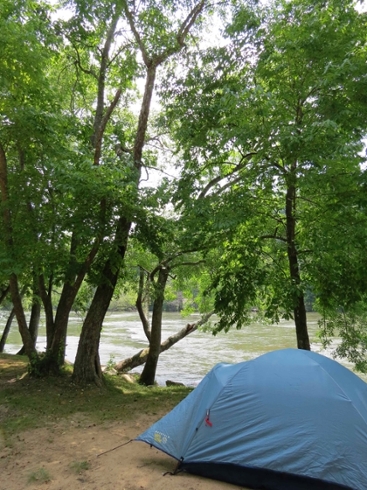
My summer so far has been pretty all-American: I’ve mostly been driving. I will be spending the summer in and around Asheville, NC, looking at the relationship between bluegrass music and community building. I’ll be playing my mandolin, going to bluegrass festivals, and talking to as many people as I can about their experience in the bluegrass community. To do all of that, I decided I would need access to my car. So I left Portland a few days after commencement and drove east, past Mt. Hood and out into the Oregon desert. I went through Boise and then through the sagebrush and fuzzy country radio of Eastern Utah and Northwestern Colorado, stopping for a week to spend time in the mountains with my family. After that, I was on the road again, down from the mountains and across Kansas. Kansas is as flat and featureless as advertised, but they make up for it with high-quality billboards: paintings of Jesus peaking out from a wheat field and advertisements for the world’s largest prairie dog (50 feet tall!), along with the typical “click it or ticket” reminders.
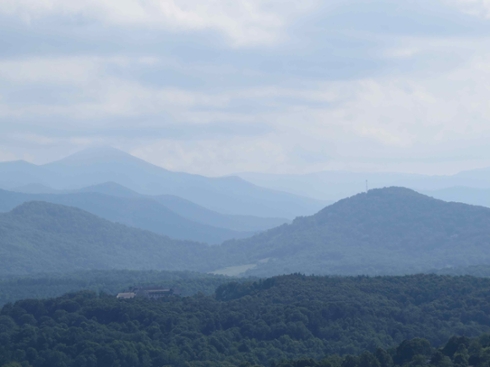
I stopped for a night on the banks of the Mississippi River in Alton, IL, the town where my dad grew up, and went on to camp in Mammoth Cave National Park in Kentucky. After Kentucky, I had to make a stop in Nashville, Tennessee. Nashville is the epicenter of country music in a lot of ways, but I went there for only one reason: I wanted to see the Ryman Auditorium. The Ryman is the mother church of country music and the place where the Grand Ole Opry radio show was originally broadcast. Almost every major star in country and bluegrass music has performed on the Grand Ole Opry, and it’s where the father of bluegrass music, Bill Monroe, really became famous. Monroe and his Bluegrass Boys played “Mule Skinner Blues” the first time he played there. Apparently it was so good that the audience demanded an encore – the first time they had done so at the Opry. I had to navigate through Nashville’s CMA Music Fest to get there, but I saw the Ryman, resisted buying a t-shirt, and made my way on to Asheville.
Continue reading Chasing Bluegrass: Katie Halloran hits the road on her PSF adventure
Greetings from the Northern California Wilderness: The Siegel Salmon Restoration Internship
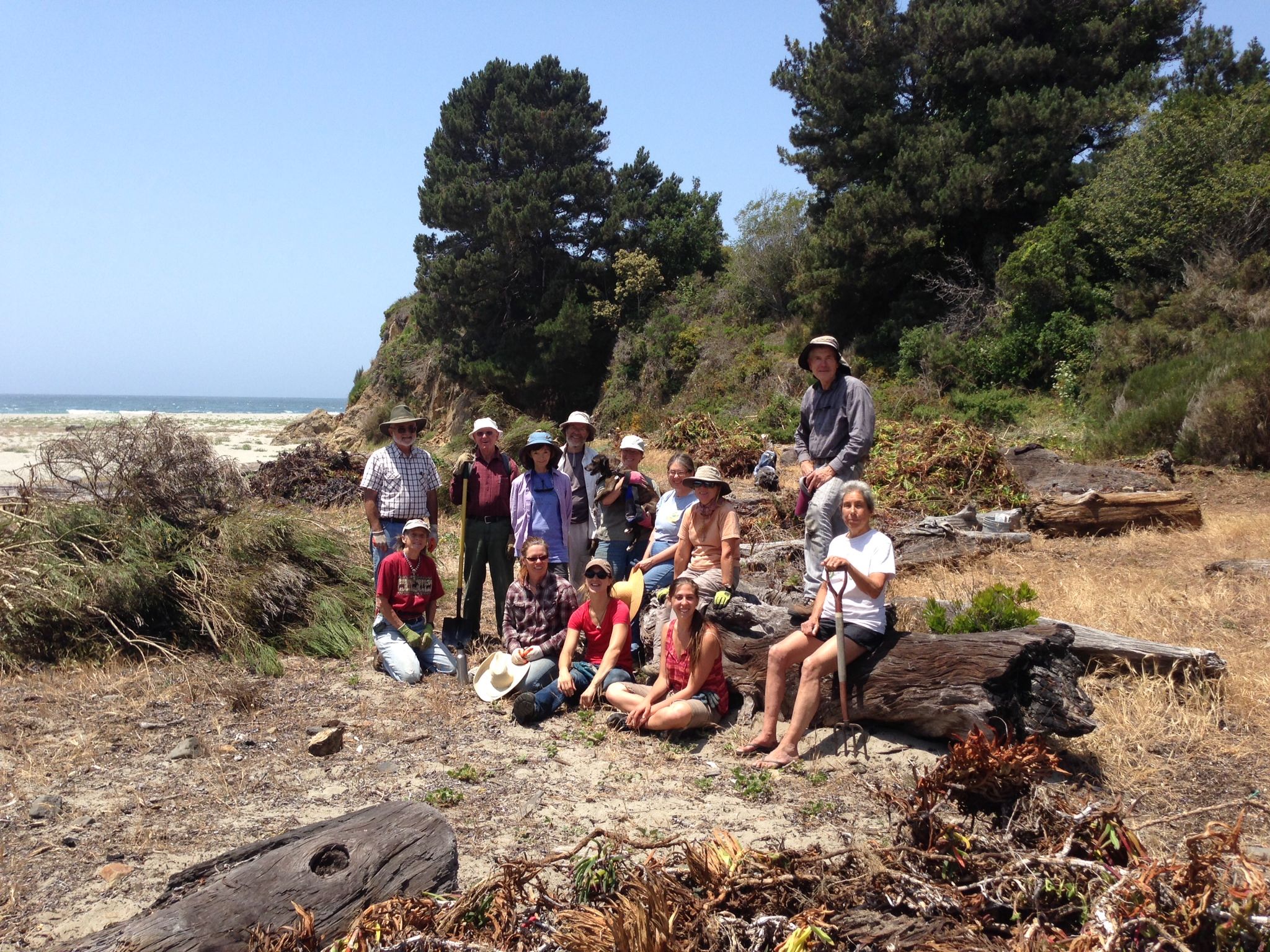
Hello from the Northern California wilderness! This past week and a half has gone by so quickly. The first thing that struck me was the natural beauty of this area. Every morning I get to run on the trails behind my cabin in Russian Gulch State Park, then I visit the beaches each afternoon. I can hear sea lions from my campfire spot, and see great blue herons on my way to work.
I spent most of last week settling into the office and meeting all the wonderful people who work here. I also got to tag along for a few bird surveys, which the Mendocino Land Trust is conducting with the help of some volunteers. I did manage to pick up a couple calls, and at the least can now distinguish between the chips of a squirrel versus those of a bird (harder than you may imagine). I also went out with a group from the Bay Area who were using their vacation time to do community service (part of a movement called “voluntourism”). They were a really friendly and lively group, and were incredibly helpful in removing the invasive species from the beaches (see photo).
Continue reading Greetings from the Northern California Wilderness: The Siegel Salmon Restoration Internship
Off Quad Rule
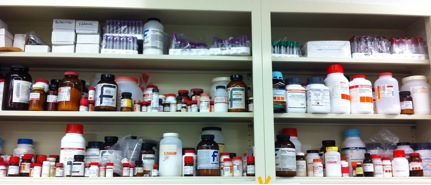
June 6, 2014
Hors d’oeuvre
Yours,
Emma (‘16)
That is how this first entry is going to end. At this point in time, that is one of only two things I’m sure of right now. The second is that I don’t want this blog to be mine. I want it to be yours to read, scroll through, be critical of, or figure out what to write to me about in your next letter to me, if I happen to be so fortunate. I’ll try to help you out as much as possible.
Consommè
Work carried out in that lab I am working in at the University of Texas Health Science Center at San Antonio (UTHSCSA) predominantly studies addiction and drug abuse in youth and adults. I will be examining the active component of Cannabis, tetrahydrocannabinol (THC), and any of its effects in cell signaling. I will try to suss out the implications this may have on locomotor and cognitive impairment from that point onward, referring to the data collected after running blood and lymphocyte samples. Explicitly, my aim in all of this is to provide information that is reliable in instructing those regulating, prescribing, and using marijuana, so that they may dispense and use it safely.
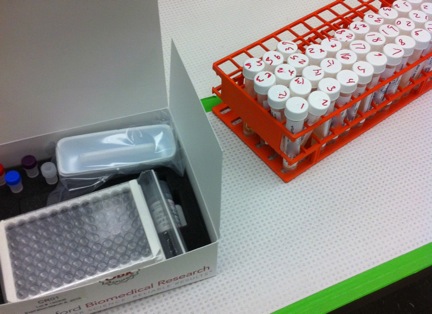
Continue reading Off Quad Rule
Financial Fellowship Trip in New York

The Financial Fellowship Trip was a great experience and introduction to the different opportunities in the financial services industry. We met with a series of different firms in New York and were able to get a better understanding of what it would be like to work in finance and what the work culture is like at smaller vs. larger firms.
We were fortunate enough to meet and connect with other Reedies in New York and see what would life beyond reed look like and what might the transition be like from Reed to finance. The experience was overwhelming and exhilarating and I would strongly recommend others students to apply next year.
Continue reading Financial Fellowship Trip in New York
Old Thimi, Nepal, Potters of the Prajapati Community

The streets of Old Thimi hum with the sounds of spinning wheels and the shuffling of terracotta, and there is a distinct scent of ash and mud. The just-thrown planter pots, whose silver bodies mingle with sleeping dogs in the sun, dry in alleys seemingly indifferent to the motorcyclists who carefully dodge by. There is always a bustle of activity in these streets and courtyards, and more often than not it surrounds some process related to pottery. Stacks of pots, dry, wet, or fired, line the streets. Piles of hay and ash wait in courtyards to be sacrificed for the transformation of wet clay into terracotta. Massive chipped water jars sit in dusty corners, bearing witness to their own extinction. In the past 50 years the ceramics industry in Kathmandu Valley has undergone significant change. What was once a booming market demanding a diversity of clay products has since significantly dwindled. Today, one finds few potters making anything besides planter pots, rice beer distillers, and popcorn bowls, which betray Thimi’s reputation as home to the craftsmen who throw the largest pots in all of Nepal.
Continue reading Old Thimi, Nepal, Potters of the Prajapati Community
Reed Winter Externship Reflections 14: Number twenty-seven, Sewerage Agency of Southern Marin, Kathleya Strode

Sewage treatment isn’t exactly what we would call a ‘sexy science’, but it is a job for a true environmentalist. I learned this when I spent about a week shadowing chemist Liz Falejczyk at the Sewerage Agency of Southern Marin (SASM) in the north San Francisco Bay area.
I arrived on Sunday and drove with Liz to her home in Sonoma County, which is way north of Marin – as we drove, we passed the SASM building (which is just north of the Golden Gate Bridge) and a lot of gorgeous farmland. I took the opportunity of arriving on a non-working day to visit the Armstrong Redwoods State Natural Reserve and take a look at all of the gorgeous trees. I had never seen redwoods before, so it was a huge treat.
Monday morning we woke up early and arrived at the plant just in time to see the sun rise. I got a tour of the entire grounds, beginning where the sewage enters the plant in a room that is referred to as the headworks. Just as the sewage plant was built in the lowest area in the valley so that most of the pipes can flow with gravity, the headworks are underground in the lowest point of the plant. Sewage is then screened to remove plastic and other non-processable items and pumped through another room up to ground level.
Continue reading Reed Winter Externship Reflections 14: Number twenty-seven, Sewerage Agency of Southern Marin, Kathleya Strode
Reed Winter Externship Reflections 14: Number twenty-six, Thompson-Schill Lab, Phoebe Bauer

Despite having only a couple days to explore, this externship was productive and enjoyable. Sharon made sure to set up plenty of good things to make the best use of our time, so we bounced between people pretty quickly. We got to see a technique called transcranial direct current stimulation in action, with Ben as a participant. tDCS (see image) involves electrodes that pass a current intended to stimulate or impede neural firing through a certain section of a brain, therefore manipulating the behavioral outcome on an activity.
We also had the opportunity to talk individually with a number of Sharon’s graduate students and post-docs, hearing about their particular research projects in her lab as well as their career trajectories. This was incredibly useful, since we don't have access to people in those positions at Reed. Many of them encouraged us to take time off and see more of the world before entering grad school, because once on that path it will be a long time before we get another chance to do so. But having done their wandering they all seem quite happy to be where they are now, and I think their diversity of perspectives is one thing that makes her lab a good one.
Continue reading Reed Winter Externship Reflections 14: Number twenty-six, Thompson-Schill Lab, Phoebe Bauer
Reed Winter Externship Reflections 14: Number twenty-five, Saturday Academy, Jeremy Cosel
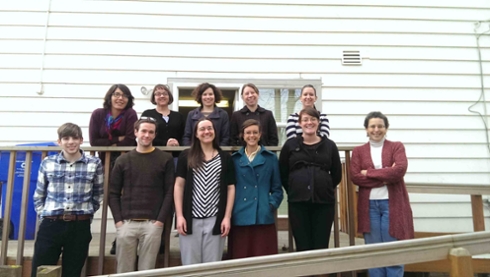
Over my winter break, I went to visit the Saturday Academy administrative office located on the University of Portland's campus, and it was quite fun! I met some outstanding individuals who work not just for a living, but in order to provide quality academic programs for kids all across Portland and the greater Oregon area. That's the benefit of being a non-profit: you do work that is relevant to your interests, but also participating in a group that makes quite a meaningful impact on the community. During my weeklong visit, I helped staff revise internship descriptions provided by several dozen major companies across Portland, a part of Saturday Academy's Apprenticeships in Science and Engineering (ASE) program. Thinking about how to best incorporate a diversity of high school students regardless of their gender or socioeconomic status is something I have never considered, and was a thoughtful challenge for me. With an interest in Technology and Education, I learned about all the hard work that goes into organizing the hundreds of educational opportunities Saturday Academy provides, and was proud to assist with tasks in the background in order to provide a great experience for the families signed up with Saturday Academy this year.
Continue reading Reed Winter Externship Reflections 14: Number twenty-five, Saturday Academy, Jeremy Cosel
Reed Winter Externship Reflections 14: Number twenty four, SASM, Ilana Novakoski
I enjoyed learning about the workings of a sewage treatment plant. When I arrived, I was given a tour of the facility. First I saw the wet wells, where the raw sewage initially enters the plant. From there, the water travels through deep tanks where the solid waste can settle out. The water then trickles through giant towers where bacteria, grown on honeycomb-shaped sheets of plastic, break down dissolved towers. Not all sewage plants operate with the exact same format; during my time with SASM, I toured four treatment plant facilities. The plant in San Francisco was partially under the zoo. It also had facilities to treat its own odor. Another treatment plant was stacked on top of itself so that it took up as little space as possible. I watched the lab technician sample the effluent and observed the different tests run on the effluent to make sure it was fit to release into the bay. I also learned about the problem of leaking pipes and how the administration decides whose job it is to fix the various sewer lines. Finally, I shadowed an inspector as she looked at the grease traps of restaurants and commercial kitchens.
Reed Winter Externship Reflections 14: Number Twenty three, Corey McPherson Nash, Sanjeev Verma
For my externship I worked with Michael McPherson '69, the creative director and co-founder of Corey McPherson Nash, a design and branding firm in Boston. Michael studied philosophy at Reed, but then received his MFA from the Rhode Island School of Design. He described this transformation romantically, musing that he stepped out of the Reed library one evening after completing his Yale PhD application, and saw before him a gleaming sunset envelop the campus. The sun set and he saw the light. Something struck him that day, and he immediately withdrew his application to Yale. He moved to a cooperative farm in Washington to ponder his next move. Here he refined his skills in calligraphy and increased his knowledge of typography. His zeal for design eventually led him to RISD, where he was a member of the first graduating class.
Since then, Michael has inscribed a culture of unwavering commitment to creativity and quality design at his firm, Corey McPherson Nash. The firm produces meticulously-crafted branding material and emphasizes a cooperative relationship with clients to determine their brand position. During my externship I was able to step into Michael's shoes for a few days, and gain exposure to video and graphic designers who were passionate about making great products. I saw their intensive creative process unfold first-hand and began to understand the necessity of making countless renderings and revisions; I appreciated their cooperative work environment; I laughed with them when they struggled to explain the difference between a vermillion and amber orange to clients. Overall, it was a fantastic experience.
In addition to the work experience, Michael's story and character left a very meaningful impression on me. He facilitated my interests, engaged me in his work, and inspired me to keep a diverse array of interests.
Continue reading Reed Winter Externship Reflections 14: Number Twenty three, Corey McPherson Nash, Sanjeev Verma
Reed Winter Externship Reflections 14: Number Twenty Two, Saturday Academy, Sam Underwood
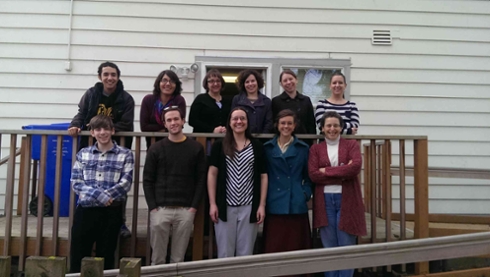
I participated in a weeklong externship with Saturday Academy, an educational non-profit established in 1983 and based in Portland. Saturday Academy’s mission is to provide supplemental learning opportunities to kids from second grade through high school. Saturday Academy organizes over five hundred classes a year, all taught by experts from the community. Saturday Academy states that their emphasis is on science, technology, engineering and math—but a quick peek at their website shows a vast array of classes in all fields, from writing to engineering to acting. This was information I knew as I headed to my externship on the first day. What I didn’t know was that the entire organization is run by just a handful of people. Just thirteen, to be exact. Over my week at Saturday Academy I observed an efficient, enthusiastic, and creative team working hard to providing learning opportunities to bright young students.
My first task as an extern involved Saturday Academy’s Apprenticeships in Science and Engineering (ASE) program. The ASE program matches up promising high school students with industry mentors. The students spend the summer in labs or in the field, working with their mentors. In January, the industry mentors had just submitted blurbs describing the work their high school-aged interns will be doing this coming summer. In addition to proof-reading these blurbs, I vetted their wording to make sure subtle gender bias wasn’t implicit in the language chosen by the writers. As it turns out, gender bias in job descriptions is a persisting issue and data indicate this wording-bias contributes to women being underrepresented in STEM fields. Saturday Academy is deeply dedicated to providing opportunity to all children, including those historically underrepresented in STEM.
Jeri Janowsky, Saturday Academy’s director, told me that a goal of Saturday Academy is to frame education as something that doesn’t have to end when the school day ends, but rather, to frame education as a dynamic, continuing experience throughout life. I strongly embrace this perspective, and Saturday Academy is embodying the idea that education can take place even after the last school bell rings. My time at Saturday Academy was encouraging and motivational—seeing an organization with such an important message flourishing gives me (otherwise absent) high hopes for the future of education in the U.S.
Continue reading Reed Winter Externship Reflections 14: Number Twenty Two, Saturday Academy, Sam Underwood
Reflections on a year abroad in London

I’ve dreamed about living abroad since I was 12 years old. After seeing pictures of my family and their trips, the feeling of talking to my Swedish grandmother, and hearing so many good things about the social democracies of the Scandinavian countries, I needed to travel and see it for myself. Not only has Reed opened doors for me in education and connection, it also allowed me to pursue my long held dream of living and studying abroad. Now I have lived in London for almost 9 months, attending the London School of Economics (LSE) and enjoying the fruits of my labors. But let’s back up a little bit. How did I get here?
Continue reading Reflections on a year abroad in London
Reed Winter Externship Reflections 14: Number Twenty One, Robert Wood Johnson Foundation, Robert Haas
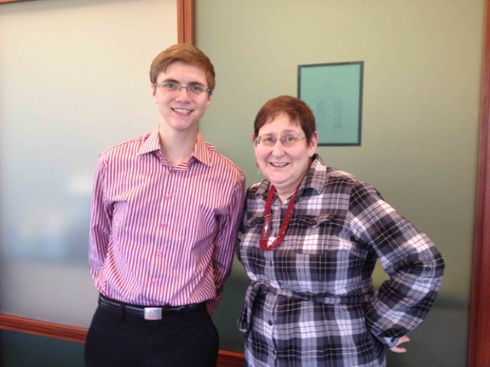
I did my first externship at the Robert Wood Johnson Foundation in Princeton NJ, and it was completely rewarding. My mentor, Laura, included me in all her day to day work as an evaluator for one of the largest philanthropic foundations in the world. I learned about the public health advocacy the Foundation does, and gained valuable insight into the health care system of the United States. This externship also showed me what its like to work in a busy office, with meetings and conferences and cubicles. More importantly though, it helped me expand my career interests and gave me valuable contacts in public health.
At the Foundation I helped do research for one of the grant evaluations that Laura was involved in, and also met with public health officials looking to get a grant from the Foundation. I even helped Laura, my mentor, with her chapter of a public health textbook for the new edition. All in all, this externship was great, I learned a lot about public health advocacy, and the externship has helped broaden my horizons in the job search field.
Continue reading Reed Winter Externship Reflections 14: Number Twenty One, Robert Wood Johnson Foundation, Robert Haas
Financial Services Fellows, Sarah Brauner
As many of my fellow Financial Services Fellows have blogged, this spring break, a group of Reed students (myself included), traveled to a very far and foreign land, where people wear nice suits, and eat steak, and talk about mortgage backed securities, and follow sports: Wall St. Before the trip, I literally could not fathom what went on at this mythical place whose name alone probably induces shudders among at least 50 percent of the student body. Assuming that my ignorance is the rule rather than the exception, I thought I’d spend this blog post illuminating a bit of the world inhabited by some of the most powerful people in the world. What follows is a brief selection of some of my experiences on Wall St; I’ll let you all cast your own judgment (or go on the trip next year to see it in the flesh!)
During Spring Break, I…
Obviously, this list does not encompass even a fraction of Wall St., or my brief time there. The purpose is more about giving a taste, and maybe piquing the interest, of students to partake in this Reed-sponsored journey to what might not actually be the dark side.
Continue reading Financial Services Fellows, Sarah Brauner
Reed Winter Externship Reflections 14: Number Twenty, AppFog, Richard Adcock
"Marketing is something you do when people don't want to buy your product."
Part of a spirited lunch-hour debate, this quote from my sponsor (Richard Kotulski-Wakefield of AppFog) carries a lot of meaning. Hyperbolic, maybe, but the sentiment pervades many tech startups. If your idea is good enough, just give the beta of your product to the relevant bloggers and tech journalists, and it'll take off by itself. So the thinking goes. This somewhat romantic notion--software market as meritocracy, if you will--attracts the ambitious and the free-thinking in equal measure.
The successful are both.
Reed Winter Externship Reflections 14: Number Nineteen, Redden and Findling LLC, Luke Hackenberg
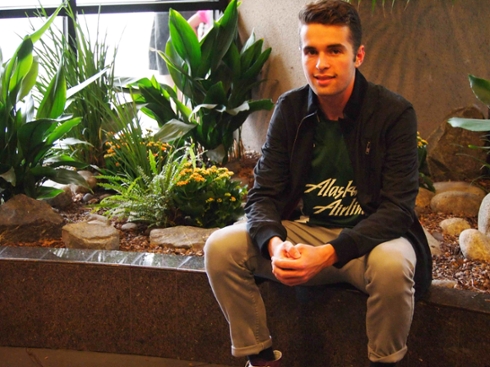
The experience I had with the Redden & Findling externship was a wonderful one. The people I met over the course of the week were phenomenal, being professionally informative as well as welcoming. I am completely satisfied with the knowledge I gained and I am grateful to the Redden & Findling firm as well as The Center for Life Beyond Reed for providing me with this opportunity.
The externship at the law offices of Redden & Findling seemed to be slightly different than the other externships offered, since it gave a firsthand look into the professional lives of a high-paced law office in East Portland. Traditionally, it’s quite difficult to find opportunities in the area of law as an undergraduate student because of the large pool of graduate law students around the country who are also competing for internships and employment. This externship is a rare experience and it should absolutely be taken advantage of if it continues to be offered.
The highly specialized nature of practicing law generally excludes most untrained students from participating, but Mike Redden found a great balance between observation and engagement that kept me interested for the duration of the week. Rather than have me do office work or simply sit and watch, he narrated almost all of his tasks to me so that I would have some idea of what was going on. All of this insider knowledge about the workings of law firms, estate planning and the ins-and-outs of the law code, combined with fanciful stories of the old days at Reed College, national bridge tournaments, and travelling across Europe made the week energetic and exciting. Unfortunately for Mike, he broke his femur weeks before and was confined to his home office, but it was better than ever for me – delicious lunches made by his wife and the company of two loving dogs by my side was more than I could ask for! His hospitality, willingness to answer all questions, and general light-heartedness showed me a side of law that I’d never seen before.
Continue reading Reed Winter Externship Reflections 14: Number Nineteen, Redden and Findling LLC, Luke Hackenberg
Reed Winter Externship Reflections 14: Number Eighteen, Our House of Portland, Florence Randari
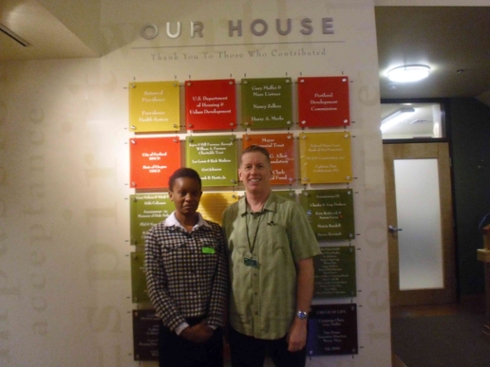
My name is Florence Randari, an international freshman student from Kenya. I am a prospective Math Economics major planning to join Business School after Reed and start a career in the financial services field. Through the help of my career adviser, Brooke Hunter, I managed to get a winter externship with a non-profit organization called Our House of Portland, to learn more about running and managing of non-profits.
Our House of Portland is a non-profit organization that provides healthcare, housing and other vital services to low income people living with HIV/AIDS. My host was Allen Brady who is the Director of Business services in the organization. Allen took me through a detailed information session on how he manages the finances of the organization, writes a budget and prepares an Annual Financial Statement for the organization among other duties. Being a non-profit, I was interested in knowing how they get the large amounts of money to offer free services to the 14 clients in the Neighbourhood Housing and care program as well as provide food banks, clothing and household items to over 700 people living with HIV/AIDS.

Continue reading Reed Winter Externship Reflections 14: Number Eighteen, Our House of Portland, Florence Randari
Reed Winter Externship Reflections 14: Number Seventeen, Multnomah County Library and Forbes Library, Rebecca Garry
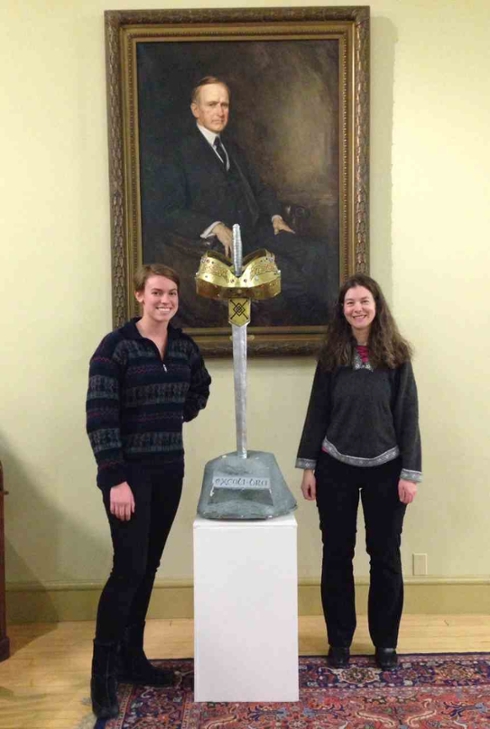
For my externships, I worked for a couple of days with the Multnomah County Library early childhood outreach services. I also went to Northampton, Massachusetts for a week and worked at Forbes Library. I went into the experience wanting to learn about what day-to-day work was like for librarians; I didn't have very high expectations, I just wanted to see what I would learn when I was there. I didn't even really think that I wanted to pursue the library world very strongly before my externship. I was totally blown away! I learned so much, and had a wonderful time. I am completely considering getting an MLS now.
The best part of my experience was working in the archives at the Forbes Library, which housed not only the local history archives for Northampton, MA, but also the collection of the Calvin Coolidge Presidential Museum. I felt completely at home in the archives, and like I could have spent days and months on end just exploring.
When I first started working in the Calvin Coolidge archives, the archivist Dylan told me that NBC had called the day prior and asked for a recording of Calvin Coolidge's first State of the Union address (the first State of the Union that was on the radio). He had looked around for it a little, but didn't think that it even existed, and told the reporter it wasn't in the archives. A few days later, a former archivist called and said she knew the recording was around...she said "it is in a cassette tape, in a drawer." This collection wasn't organized in a particularly accessible fashion; it was basically a room full of large cabinets and boxes with all sorts of different things in them. So when Dylan told me to go look for the recording, he didn't have very much hope, but he thought it would be fun for me to at least familiarize myself with all of the material. After sorting through for a while, I found a very old shellac 78 with the speech on it. Dylan came back and told me that we couldn't really send that to NBC, and after looking for a little while longer, we found a CD someone had transferred the speech to. Success!
Continue reading Reed Winter Externship Reflections 14: Number Seventeen, Multnomah County Library and Forbes Library, Rebecca Garry
Reed Winter Externship Reflections 14: Number sixteen, Minnesota House of Representatives, Paul Messick
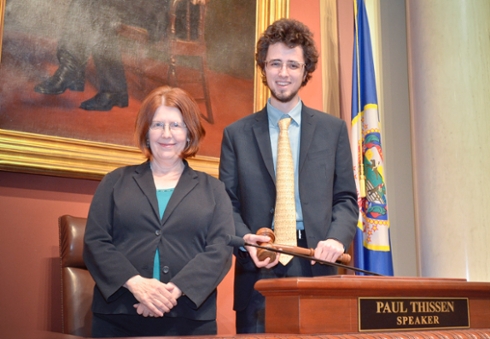
State government doesn't get much love from pop culture. There's glamour in Washington D.C., (House of Cards, The West Wing) and there's down-home folksy know how at the municipal level (Parks and Recreation), but state government is a black hole where entertainment magnates dare not tread. Over the course of my externship working along side a state legislator, I learned that state government (or at least my state government at home in Minnesota) is more deserving of a long-running Emmy award-winning television series than federal or municipal government. While municipal budgets are collapsing and Washington is gridlocked, state governments are, due to a number of factors, quietly wielding more and more influence over the way federal policies are implemented and designed. Moreover, with Washington caught in its own headlock, states are being tasked with solving big problems on their own. I interned with Tina Liebling — my local House representative, and mother of Sam Liebow, '14. Rep. Liebling is the chair of the Health and Human Services committee in the Minnesota House of Representatives. For a week, I watched as Liebling and her staff geared up for an extremely short legislative session -- in the words of my Governor, Mark Dayton, an "un-session." The short length of this “un-session" is meant to force Democrats and Republicans to get their grievances worked out before their bills hit the floor. During my externship, Liebling and her staff were setting her committee's schedule for the upcoming session. This meant meetings with lobbyists, constituents, and other legislators. I had the opportunity to sit-in on some of these meetings, mostly those between Rep. Liebling and a lobbyist or lobbyists. As someone who had never met a lobbyist before, listening and watching them work was quite interesting. A few of the lobbyists I met seemed like very highly-paid, extremely-biased research assistants. These lobbyists laid out a problem, a solution and, frequently, gave Rep. Liebling a bill to sponsor. Other lobbyists seemed like professional hand-holders, navigating their clients through the political process, and keeping them on message. The importance of lobbyists became clear to me over the course of the externship. It is simply impossible for a legislator to have an encyclopedic understanding of every topic they will encounter from medical licensing disputes, to volatile organic compounds. Lobbyists pass on information in thirty minutes that would take a legislator a week to research, allowing the legislator to craft a more informed opinion on the subject. The trick, I think, is to separate the facts from the spin. The better the lobbyist, the more difficult making that distinction becomes. I found myself trying to disentangle truth and “industry opinion” quite a lot over the course of the externship. I was tasked with researching and writing a report on the long-term care insurance market during my externship. The cost of long-term care is spiraling out of control. Minnesota’s “Medical Assistance” program (our version of Medicaid) could be spending $5 billion on long-term care in 2035 — which could bankrupt Medical Assistance entirely. Every stakeholder has a different solution to this problem, from massive tax incentives to entice people to purchase long-term care insurance, to mandating every man, woman, and child to carry long-term care insurance. If you want to read more about the advantages and disadvantages of currently proposed solutions and the long-term care insurance market, you can access my report here:
https://app.box.com/s/aooz4jur2fczp7nl0adg
Continue reading Reed Winter Externship Reflections 14: Number sixteen, Minnesota House of Representatives, Paul Messick
Reed Winter Externship Reflections 14: Number Sixteen, Method, Isabella Jorissen

David Lipkin, Reed class of 1991, is one of the co-founders of Method, an experience design firm, which was founded in 1999. Method currently has offices in San Francisco, London, and NYC. I spent two weeks at Method as an extern in the NYC office. While at Reed, David majored in history and also focused on anthropology. Currently, he manages the strategy and business development of the NYC office, though he also maintains an active role in many of the projects.
Despite all of the projects, clients, initiatives, and goals that Method juggles, it doesn’t come off as a stressful place to work. Their fifth floor space is open and well lit; nobody has an office. There’s a basketball hoop mounted on one of the walls, and I quickly learned that late afternoon breaks to play games of dice were commonplace. Everyone was friendly, and interacted with each other as peers. Until I spent time at Method, I didn’t fully appreciate how valuable a relaxed and comfortable atmosphere is to facilitating creativity in the workplace.
With that said, I confess that when I arrived at 9:30 on the first day, I was apprehensive. I wasn’t sure what I was going to be doing for two weeks. I felt like I didn’t have any design skills to speak of, and my front-end development skills definitely didn’t seem up to par. But everyone welcomed me and it was fine, I suppose. One of the best parts about my experience at Method was that there was so much going on- and so much that I could do- that I had to let go of the uncomfortable feeling that I was an intruder very quickly. After the morning standup, I was invited to observe one of the project meetings. I stood in the corner of the area watching when the project lead turned to me and said, “Feel free to jump in with any ideas or questions you have.”
